Alumni Spotlight: Ross Chambless
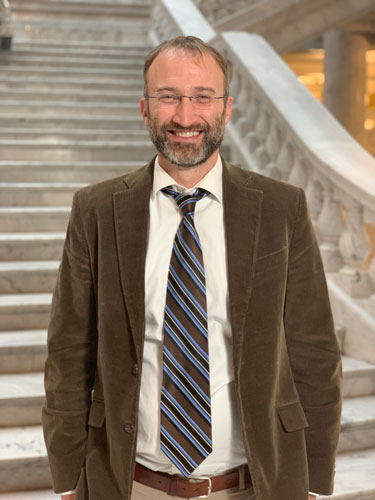
Ross Chambless graduated from our program in 2011 and is now the Communications and Community Engagement Manager for the Wilkes Center for Climate Science & Policy at the University of Utah. Ross is a writer, creative producer, and communications strategist. Prior to joining the Wilkes Center, he was Communications Director for the Democrats in the Utah House of Representatives and a radio and podcast producer. Ross has a Bachelor of Journalism degree from the University of Texas at Austin (2001).
For several years Ross produced and hosted multiple programs on KCPW Salt Lake Public Radio, including Both Sides of the Aisle, The Bottom Line, The Hinckley Institute Radio Hour, and the Daily Buzz from the Sundance Film Festival. He was a frequent contributor to The Source on Utah Public Radio about water in Utah, and he assisted The Scope podcast for University of Utah Health. He also partnered with the nonprofit Artes de Mexico en Utah to create their podcast Nuevas Voces: a podcast reexamining Mexico through its art. Ross frequently focused his creative audio storytelling on science and environmental topics. Several of his stories received awards by the Utah Society for Professional Journalists.
Growing up on the East Bench foothills of Salt Lake City, Ross’s family regularly hosted international students, which helped to shape his curiosity and appreciation for different cultures and ways of living. Ross taught English for four years in Salt Lake’s oldest Sister City, Matsumoto, Japan, where he also met his partner Ikue. Together they are raising two bicultural daughters. In their free time Ross and his family enjoy hot springs, traveling, bicycling, and camping.
During the Spring 2023 semester, I sat down with Ross to talk about his work with the Wilkes Center and his background in policy, journalism, and storytelling.
Brooke: What does your work at the Wilkes Center entail? What's exciting you about your work there?
Ross: It's a new center. It was started last summer of 2022 with a very generous donation from Clay Wilkes, an entrepreneur and philanthropist. It is housed in the College of Science, and there are lot of ambitious goals, including research funding, with the goal of making a hub for climate research and policy for the University. I am now one of two full-time staff members. There's a leadership team of faculty too. I came on board in January of this year to start pushing this whole project forward. It's science heavy right now, which makes a lot of sense, but I've come into this position with a different background. One way I see my role is to help bridge the policy side. I just spent the past five years working for Utah's House of Representatives. I also have a background in journalism, mostly radio journalism, and storytelling. I also grew up in Salt Lake, so I have a lot of attachments and familiarity with the state and our politics and issues.
I think out of all the highlights that have happened with the Center so far in its first year is the Great Salt Lake Strike Team. It sets up a good model for how the Center can interact with state agencies and policymakers. We’re not trying to impose or advocate but more going to policy makers and saying, here's an assessment of your policy options, you're the decider, so make the best decision. Here's what the science says, so choose your own adventure. I think that's really what the center is going to be strong at and probably the best way we can function. Our faculty spent a lot of time in the fall working on the Great Salt Lake Strike Team report and it was released in February of this year. Now, one hopes that the report gets picked up and read. It outlines all the solutions, like if we do want to run a pipeline all the way from the Pacific Ocean, here's what it requires. Most of the better options are conservation related. That’s when you get into the weeds.
I also think we hope that the Strike Team can be applied to other things, like maybe an air quality strike team. The other ways the Wilkes Center is helping with Great Salt Lake issues is in the form of various research projects, from all different levels, which really comes down to students. If there's students who feel passionate about something and want to get involved with a scientific endeavor, even if it's an interdisciplinary approach, I think there's a ton of funding for that.
Brooke: What was your experience in the Environmental Humanities Program like? What was the focus of your research?
Ross: I started in 2009 and graduated in 2011. I think we were the fifth cohort in that program. So, it was fresh when we started. To put it into context, though, that time period was the depths of the Great Recession. So, I decided to go to grad school because there weren't a lot of job opportunities. It was a tough time for anyone who was of working age. The program was attractive to me because they had some fellowship opportunities and it seemed like a great program. I had just come back from spending about four years in Japan, and I was ready to go back to school. Terry Tempest Williams was one of my professors, and that was right about the time they sealed the deal with the Taft Nicholson Center in Centennial Valley, so we did a writing workshop up there, which was great.
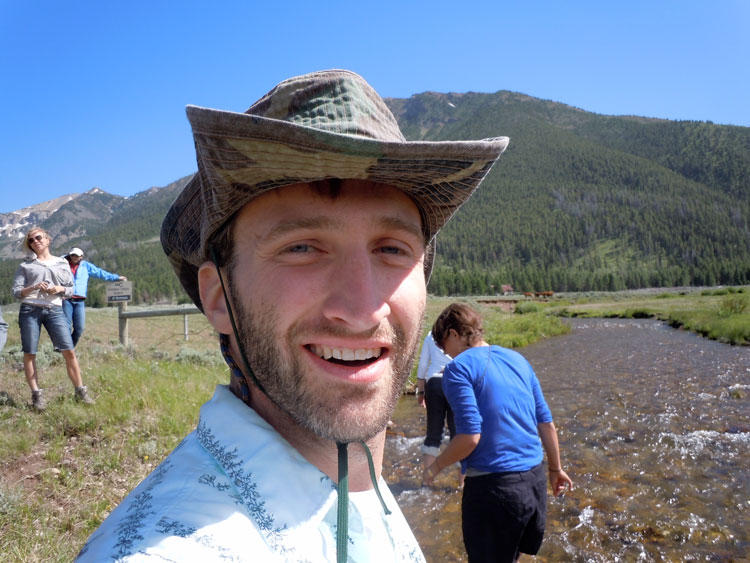
Ross with classmates in the Centennial Valley.
My final project focused on asking, where does our electricity come from? I had experience doing radio documentaries, so I decided to do a long form audio documentary about trying to find where the electrons are coming from that I'm using. That led me on these various adventures throughout the state. I basically became a nuisance to Rocky Mountain Power and Questar, which was the gas company at the time, to get tours of power plants. I learned a lot. It was a fun project because I could actually produce something, apply it, put it out into the community in the form of journalism, and hopefully advance knowledge in different ways.
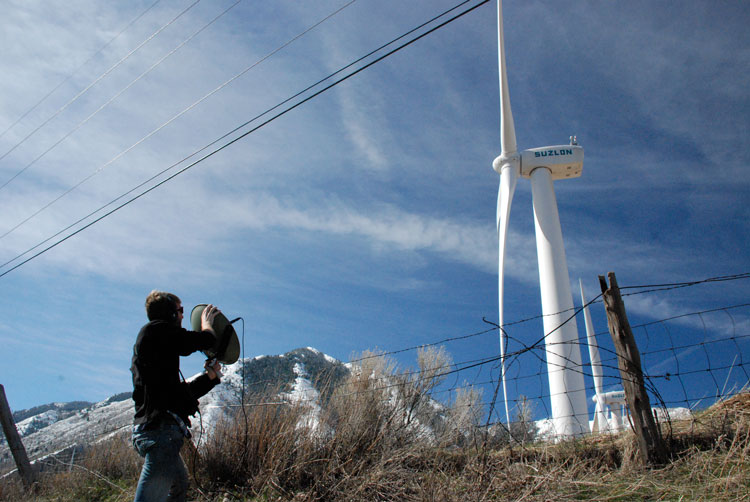
Ross conducting research for his Environmental Humanities project on electricity.
I think my favorite lasting memory is just how much of a tight knit group my cohort became. We still occasionally have reunions. We shared so much about ourselves, which was very raw, and stuff that I don't think I'd ever share with other people. We went up to Centennial Valley for our writing workshop. We would go out to the Great Salt Lake together. We went to Great Basin National Park one time. When you go through those experiences with people, it changes you.
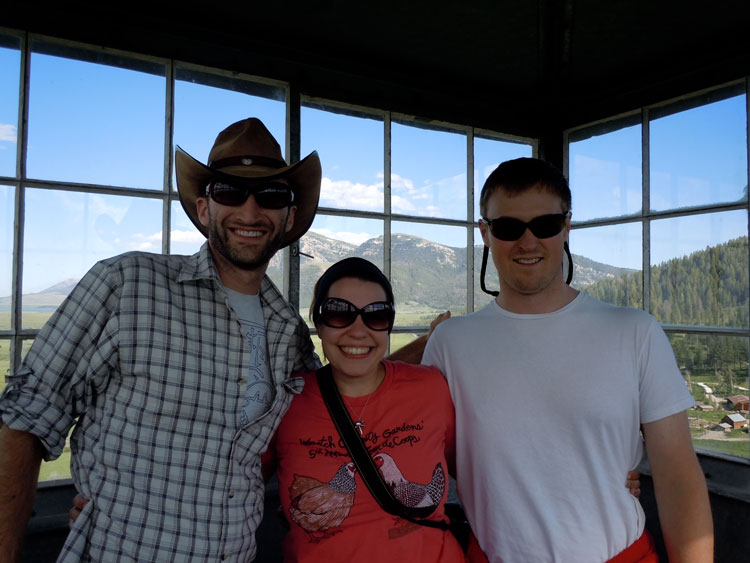
Ross and Environmental Humanities classmates in the fire tower near the Taft Nicholson Center.
Brooke: Can you share more about your background? What work were you involved in before and after the Environmental Humanities Program?
Ross: I went to the University of Texas, Austin for undergrad, and after graduating I thought I was going to work for a newspaper, but then 9/11 happened and there were no jobs. So, I volunteered with the Winter Olympics and came back to Salt Lake in 2002. Then I just decided I was tired of this country, because we were about to invade Iraq and it was a rough time, so I took a job teaching English in Japan for four years. I ended up meeting my partner who would become my wife later and we have two beautiful daughters now. After I came back from Japan, I became part of the Environmental Humanities Program. While I was in graduate school, I did an internship with the Office of Sustainability, and I got a grant to replant an orchard down at the Rio Mesa Field Station outside of Moab. That led me to a job after graduating with TreeUtah. After that, I went back into full time radio, because I've always loved radio storytelling. I was a producer at KCPW for about four years. I produced a business show, an entrepreneur show, a politics show, and I built connections with the Hinkley Institute of Politics and produced a “radio hour” for them. But working in public radio is tough. You're always fundraising, there's not much money in it. As soon as I started having a family and kids to feed, I decided I needed something more stable.
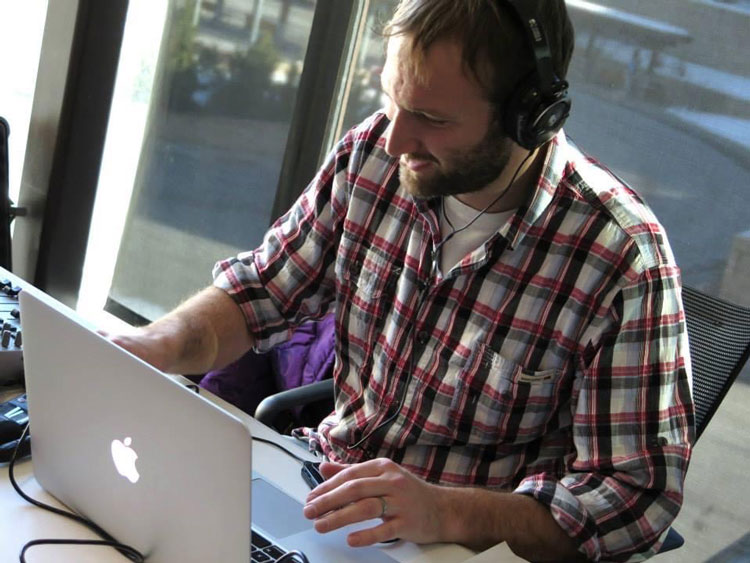
Ross working on a radio story.
Through one of my shows, I was able to connect with legislators and a job opened to do communications for the Utah House Democrats. I come from a political family. My dad taught political science at the U for many years. I think the Democratic legislators felt comfortable with me because they knew my dad. So, I did communications work for the House Democratic Caucus for four years, which was a fascinating job. It was tough morally and mentally. Sometimes you're on the losing side of almost everything. But good things happened too, and being around people who are creating laws is interesting. One of the highlights of my time there was working closely with Rep. Sandra Hollins, the first African American woman in the state legislature to remove language condoning slavery from the state constitution in 2020. There's a lot of pressure, especially when you have to be the voice for them [House Democrats] and deal with news media. After four years of that, I saw this opportunity at the Wilkes Center come up, and I decided to throw my hat into the ring. I think it's a good space to be in because I think the center needs more connections with the policy realm. It's heavy on the sciences and academics but not necessarily with how the sausage actually gets made.
Brooke: What advice do you have for sustaining yourself in the policymaking world?
Ross: You can't paint everyone with a broad brush. I worked with a lot of elected officials who have good hearts and they're actually making a difference. But I think it can feel daunting, and the system can make people feel left out or powerless. It can be so frustrating. I think the key is finding those people that will be an ally for you and see where you can be as helpful as possible. It does take a toll. It's not exciting for everyone. A lot of people are not really into political conflict. There were so many days that I would leave, and I would just be so frustrated. When I'd tell people what I was doing, I'd almost have to lower my voice and whisper “I work for the legislature.” A lot of progressives responded like, “Thanks for your service, man. Thanks for taking one for the team.” And it did feel that way.
On the other hand, I guess it's just partly my personality, I don't want to run away from things that I disagree with or even find revolting. I actually want to understand it. I ask, why is this so messed up? Why do these people think this way? Why are these people voting in this way? What is it about their background or their worldview that made them see things that way? How can we find where we agree? How can I help this person expand the way they see certain issues in ways that I think would improve things for all of us, for our planet, for ourselves, for our community?
I also am a white male, privileged person who grew up with educated parents and was able to go to college, and I have come to recognize those are privileges that a lot of people don't have. Living in Japan where I was a visible minority, I experienced a little bit of discrimination that woke me up. Obviously, that's not the same situation or experience as so many people of color in our country, but I think that made me sympathize a little with the experience of being a minority, I guess. I feel strongly about social justice issues, and I have tried to apply myself in ways that will open opportunities for everyone. While I was working with the legislature, I could float into those spaces because I'm privileged. When I'm up at the hill, people are like, oh, it's just another white guy. I can play the game so that I can help groups that need the help. I was also working with reporters all the time, I really value the role of reporters up there, and some legislators see them as the enemy. They just don't like having transparency. So, I would frequently, sometimes literally, open doors for people. Like, you need some information? Here's a document. You didn't get a copy of that? Let me get a copy of that. It's not like I was giving away top secret stuff. I just think there needs to be accountability.
Brooke: A lot of our students are interested in storytelling. What drew you to storytelling work, and what advice do you have for students who also want to do that kind of work?
Ross: I originally decided I wanted to go into journalism because I thought if we dive into a story and tell the truth and show the facts and science, people will make the right decision and the world will become a better place. I think I was naive thinking that way. I have so much admiration for journalists. But at some point, I stopped thinking that if people just get the information, everything will work out. I haven't seen that to be necessarily the case. I think you have to be more engaged and pay attention to where decisions are being made. I think storytelling is effective, but I would encourage everyone to make their projects or research interests into something that is going to be usable for people who make decisions. Whether that's a policy report, a book, a narrative, or a documentary, take that ambition and get involved with state politics or work for an advocacy organization. It's important to figure out how the system works if your goal is to affect policy change. For me, that's the way I look at it, because I've always been a realist, and I want to fix things. I see a lot of messed up things in our society, and I was asking myself, how do we actually fix that? Maybe it's just the way I was raised by my parents who were both in academics and policymaking. You got to get in there, and you got to influence the people who make the policies. So how do you do that? You learn how the system works. You show up and get to know who decision makers are and gradually build relationships so when they're looking for solutions, you have something ready to give. That's a long game.
Categories
Featured Posts
Tag Cloud
- community engagement (12)
- outdoor recreation (2)
- outreach (1)
- alumni (3)
- admissions (1)
- faculty (8)
- practitioner-in-residence (2)
- cultural anthropology (1)
- utah award in the environmental humanities (1)
- environmental justice (2)
- STEMCAP (2)
- STEM (2)
- water (1)
- communications (2)
- humanities (1)
- Taft-Nicholson Center (1)
- director (3)
- student (5)
- API (1)
- Asian American (1)
- Pacific Islander (1)
- graduation (1)
- research (3)
- thesis (1)
- project (1)
- Indigenous (1)
- Shoshone (1)
- Great Salt Lake (2)
- Bear River (1)
- land acknowledgement (1)
- STEMAP (1)
- public engagement (1)
- science (1)
- science communication (1)
- Wilkes Center (1)
- climate change (1)
- climate science (1)
- climate policy (1)
- policymaking (1)
- funding (1)
- storytelling (1)
- radio (1)
- journalism (1)
- racial justice (1)
- outdoor education (1)
- writing (1)
- non-fiction (1)
- energy extraction (1)
- reading (1)
- environmental education (1)
- affect theory (1)
- media (1)
- rhetoric (1)
